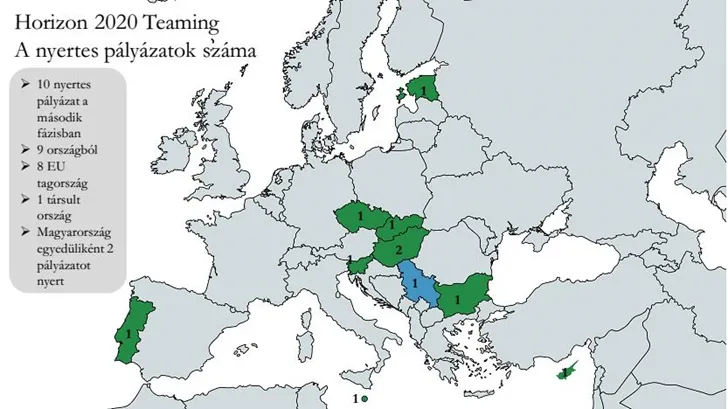Two Hungarian research initiatives among ten European excellence programmes launched
The molecular diagnostics of cardiovascular diseases, which are highly endemic in Hungary, tumour and inflammatory diseases, and the development of essential manufacturing and logistics systems for industrial production will be the core focus areas of the two new domestic centres of excellence which were among the 10 winners in the “Teaming” research excellence programme, the most prestigious Widening actionl of the Horizon 2020 framework programme.
The total amount of funding received by the two consortia coordinated by the National Research, Development and Innovation Office is EUR 26 million (around HUF 8 billion), but together with the supplementary domestic funds and the contributions of participating institutions, the total sum reaches EUR 73 million (HUF 22 billion). At the official kick-off event in Budapest, Robert-Jan Smits, Director-General for Research and Innovation of the European Commission said: the projects selected for funding in this programme indeed represent outstanding scientific excellence which can bring about structural changes in the scientific and innovation system at both regional and European level. József Pálinkás, President of the NRDI Office emphasized: it is a huge success for Hungary that from the 169 project proposals submitted from 27 countries to the two-stage call only 10 winners were selected and this group includes two consortia led by Hungarians. The NRDI Office is primarily responsible for affirming the Government’s professional and financial commitment to the projects, ensuring compliance of the project proposals with domestic research and innovation strategies, and promoting partnership between domestic participants.
The project EPIC – Centre of Excellence in Production Informatics and Control aims to create a centre of excellence with the potential to achieve remarkable results in the fields of cyber-physical production systems. In representation of the consortium László Monostori, Director of the HAS Institute for Computer Science and Control, János Józsa, Rector of the Budapest University of Technology and Economics, and Jens Neugebauer, Director for European Policy and Business Development at the Fraunhofer Institute stressed: their joint intention is to speed up innovation, create new industrial solutions, develop a sustainable and competitive production ecosystem, and “train” a generation of young researchers full of initiative and experienced in the use of international best practices. They are also eager to propagate information technologies in manufacturing technology. In the framework of the EPIC project, at the initiative of the HAS Institute for Computer Science and Control, the National Industry 4.0 Technological Platform was established with the aim to adapt the “Industrie 4.0” (the fourth industrial revolution) trend in Hungary. The project has a total budget of EUR 21.7 million, that is, HUF 6.5 million.
The project HCEMM-MOLMEDEX - Creating the Hungarian Centre of Excellence for Molecular Medicine aims to establish a centre of excellence in the field of molecular medicine with a strong focus on translational medicine, that is, the “translation” of laboratory research findings to everyday medical treatment as soon as possible. Tamás Martinek, Vice Rector of the University of Szeged, scientific coordinator of the project and heads of the consortium members, Gábor Szabó, Rector of the University of Szeged, Prof. András Jávor, Vice Rector of the University of Debrecen, Dr Ágoston Szél, Rector of the Semmelweis University, Prof. Pál Ormos, Director of the HAS Biological Research Centre in Szeged and Jana Pavlic, Joint Head of Government & EU Relations at the European Molecular Biology Laboratory (EMBL) made it clear that the consortium would particularly focus on research directions promising a breakthrough in the curing of cardiovascular, tumour and inflammatory diseases especially affecting older generations. In addition, they find it particularly important to make the consortium a regional centre of scientific excellence training and employing highly qualified researchers and engaged in cutting-edge research in molecular medicine. The new Centre of Excellence will be implemented in three locations: Debrecen, Szeged and Budapest with the seat in the ELIPOLIS in Szeged. The project has a total budget of EUR 52 million, that is, approximately HUF 15.6 million.
About the Teaming action
The Teaming action of the “Spreading Excellence and Widening Participation” section of Horizon 2020 framework programme aims to establish centres of excellence with the involvement of leading European institutions in countries whose RDI achievement is below the European top. EU Member States participating in the action: Bulgaria, Cyprus, Czech Republic, Estonia, Croatia, Latvia, Lithuania, Luxembourg, Hungary, Malta, Poland, Portugal, Romania, Slovakia and Slovenia. The action is also open to Associated Countries: Albania, Bosnia and Herzegovina, Faroe Islands, Georgia, Macedonia, Moldova, Montenegro, Armenia, Serbia, Turkey, Tunisia, Ukraine.
Video and pictures of the kick-off event here.
Presentations can be downloaded:

